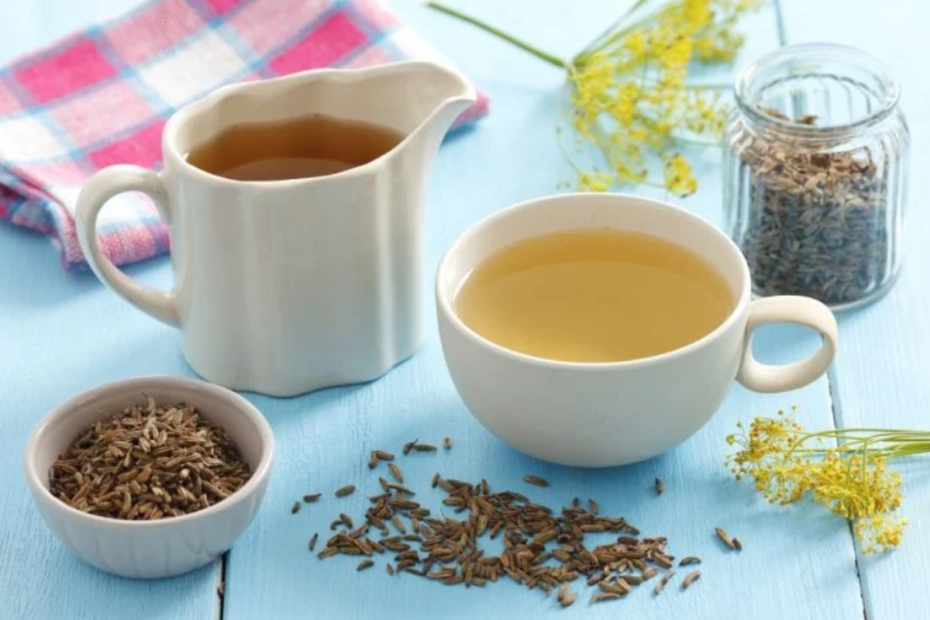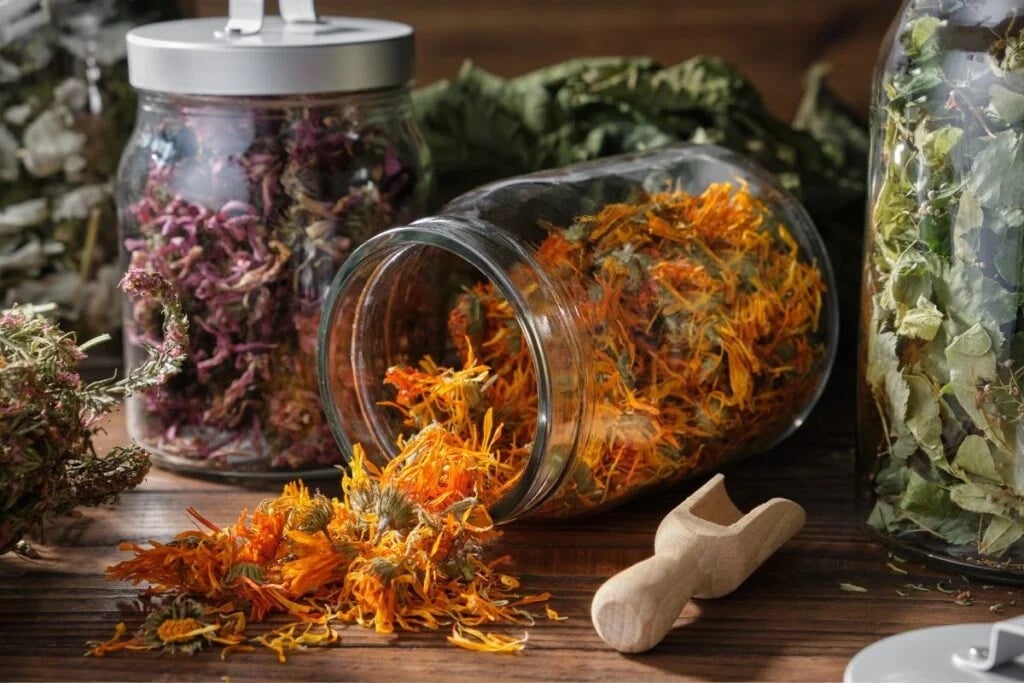Fennel: An Herb Known Since The Middle Ages
Fennel is an herb known since the Middle Ages and was hung over doors to ward off evil spirits. Nowadays, fennel is no longer a protective remedy, but fennel tea is one of the most widely used herbal remedies for everything from colic to eye diseases. It is said that fennel can give power and prolong life. Let’s see, what fennel tea benefits we can get.
Fennel (Foeniculum vulgare) is a species of plant in the celery family, a tall grass up to 80–150 cm tall with a hollow stem and yellow flowers. The upper leaves are pinnately divided, the lower leaves have long petioles, the inflorescences are umbel-shaped, and the flowers bloom from July to August.
You can pick and dry fennel seeds yourself, but you can also make a delicious health tea. You can dry the collected fennel seeds for 2 or 3 days in the sun, or to speed up the process, you can dry the seeds in the microwave for 30 seconds at a time, checking them frequently. When the seeds are dry, crush them to release more nutrients and rich oils.
Health Benefits of Fennel Tea
Fennel is a widely used herb, and you can get fennel tea benefits from drinking and healing the beverage. All parts of fennel, including the leaves, seeds, and bulb itself, are used as food and spices in cuisines. Fennel tea is delicious, but many people choose to drink it for the health benefits of fennel.
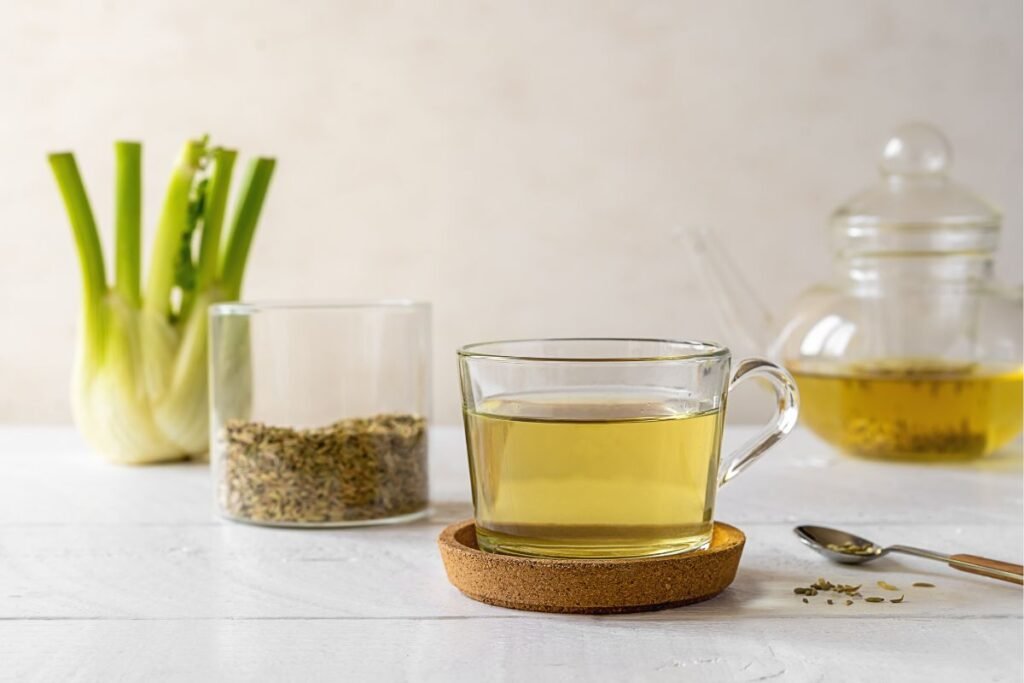
Fennel Tea and Fennel Seed Tea Benefits
- It has an antimicrobial and an antiviral agent. If you feel a cold beginning, drink fennel tea to boost your immune system.
- Fennel tea helps with the following ailments by relaxing the smooth muscles of the digestive system: constipation, bloating, and reducing gas accumulation.
- Fennel teas can treat spasms of the stomach muscles caused by irritable bowel symptoms, ulcerative colitis, Crohn’s disease, etc.
- It detoxifies the body and stimulates metabolism and urination.
- Suitable for use in cases of high blood pressure.
- Beneficial for eye diseases: it improves vision, helps with conjunctivitis, and helps prevent glaucoma.
- For lowering blood sugar levels, fennel tea has a similar effect to standard antihyperglycemic drugs.
- For painful menstruation, fennel helps to stop painful uterine contractions.
- It acts as a natural antioxidant, fighting free radicals that can cause inflammation in the body and chronic diseases (cancer, heart disease, and respiratory diseases). Antioxidants help prevent oxidative stress.
- In cases of increased appetite, they help to reduce it, avoiding uncontrollable overeating and improving digestion. Overweight people should try fennel tea, which reduces hunger and increases satiety.
- For the respiratory system, it cleanses mucus and helps runny noses.
- For pain relief, it works similar to aspirin.
- It is beneficial for anxiety, stress, and relaxation when going through a difficult period.
- Regulates hormones.
- Good for improving breath—antibacterial, clear pathogens that cause bad breath. To wake up in the morning with a fresher mouth, drink fennel tea in the evening before going to bed.
- Improves memory.
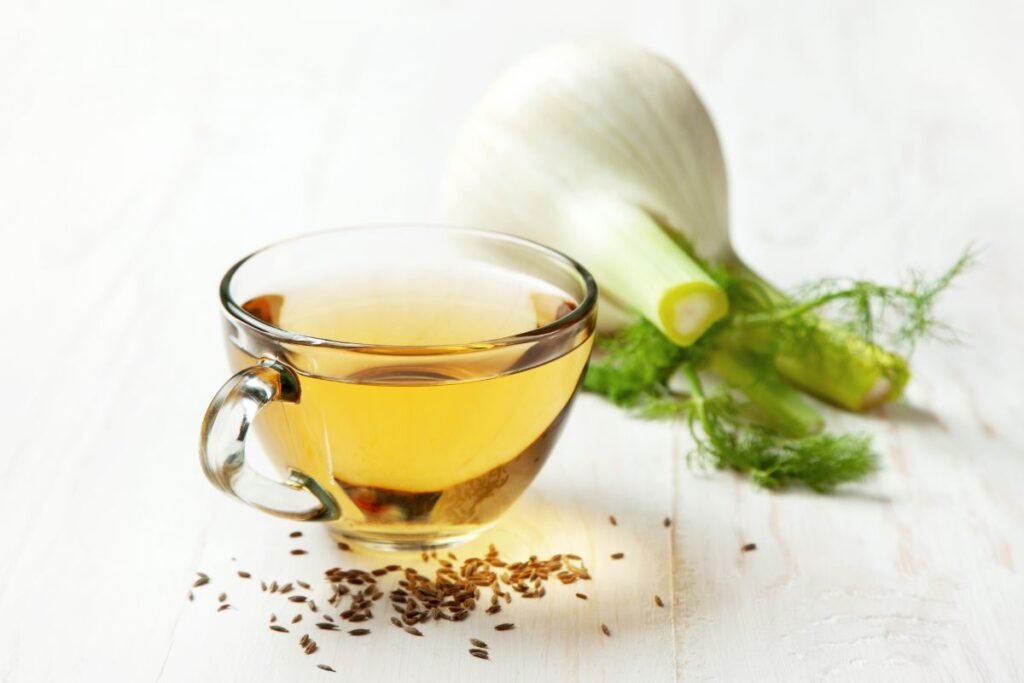
Fennel Tea Benefits: It Increases Libido and Breasts
Fennel tea has been known as a libido enhancer, especially for men. It acts as a stimulant that can improve sexual desire. For men, fennel tea also acts as a remedy that can alleviate bladder and prostate problems and improve orgasm.
Breasts tend to enlarge as girls mature due to estrogen, progesterone, and growth hormones acting on the body. Drinking fennel tea, which contains estrogen, can give you a slight increase in breast size. Girls who drink this tea will mature slightly earlier. In Southeast Asia, this tea is popular with transgender men who want to grow bigger breasts.
How to Make Fennel Tea?
The taste of fennel tea is slightly reminiscent of licorice. It has a relaxing aroma and a subtly bitter aftertaste. You can dry your fennel seeds. Another option is to buy fennel tea at almost any supermarket or health food store. But do not be confused with caraway seeds, because they look alike.
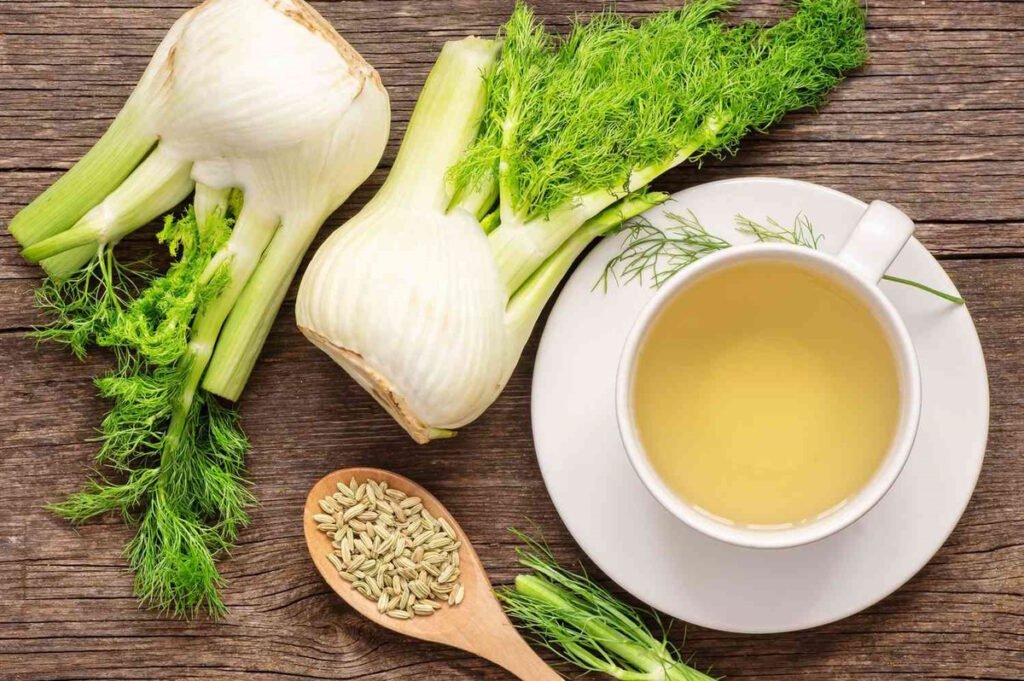
Sweet Fennel Fruit Tea
You can also make fennel fruit tea; buy it in pharmacies or supermarkets. Dry the finely chopped fennel fruit yourself.
Add 1 teaspoon of dried sweet fennel fruit to a cup. Cover it with boiling water. Cover the cup and leave it for about 10 minutes; drain before drinking. Take 1 cup 3 times a day.
Classic Fennel Tea
Fennel tea is easy to make: add half a teaspoon of crushed fennel seeds to a cup and brew with hot water. Drink after 5–10 minutes when it has settled. You can also use a tea strainer or bag. The longer you keep the seeds in the water, the stronger the tea and the more intense the flavor.
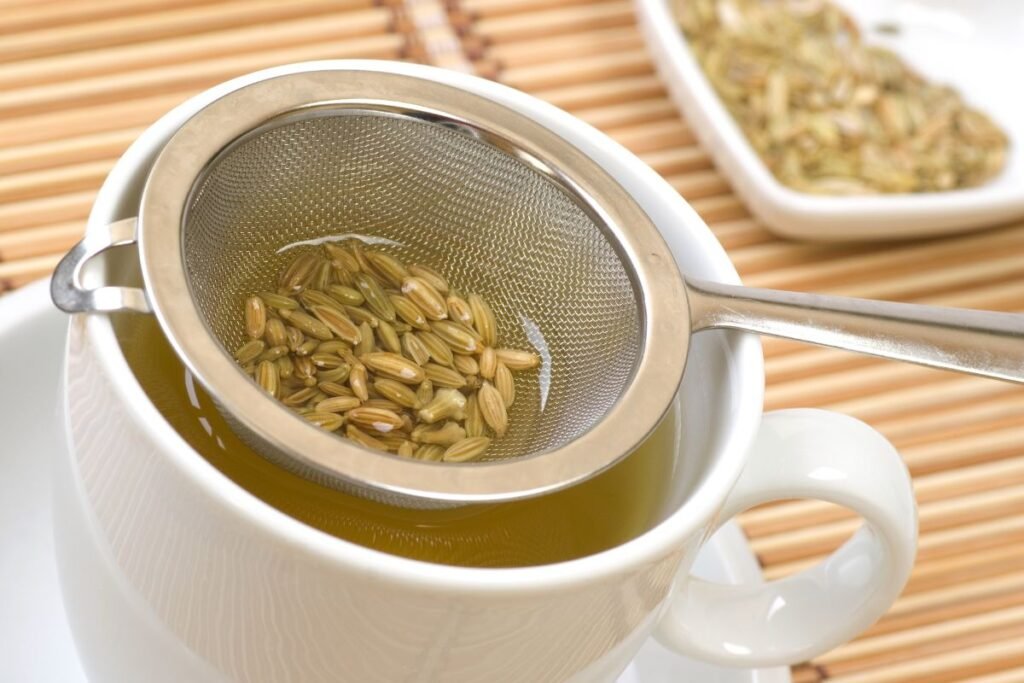
Fennel and Ginger Tea
Bring 3 cups of water to a boil in a saucepan. Then add 1 tablespoon of crushed fennel seeds and 1 tablespoon of crushed ginger root. Boil for 3–5 minutes, then cool slightly. Strain it into a cup, strain, and flavor with honey. Enjoy!
Fennel Tea with Milk
For flavors, you can make fennel tea with milk, especially for winter, to drink warm.
- Add 500 ml of water to a saucepan and bring to a boil.
- Put 1 tablespoon of chopped fennel seeds and 1 tablespoon of loose black tea, and boil for 3 minutes.
- Add 100–200 ml of milk to the decoction and boil over low heat for about 5 minutes to mix the flavors.
- If you like cinnamon, add a stick or powder to the brew. It gives the tea a more savory flavor.
- Strain the tea through a sieve before pouring it into a cup.
Fennel Seed Tea Benefits for Your Beauty
Beauty treatments with homemade fennel cosmetics can make your skin healthy and glowing. We’ll use fennel seeds for this purpose. They not only cleanse your skin of acne, dark spots, and pigmentation but also help to make it smoother and more supple.
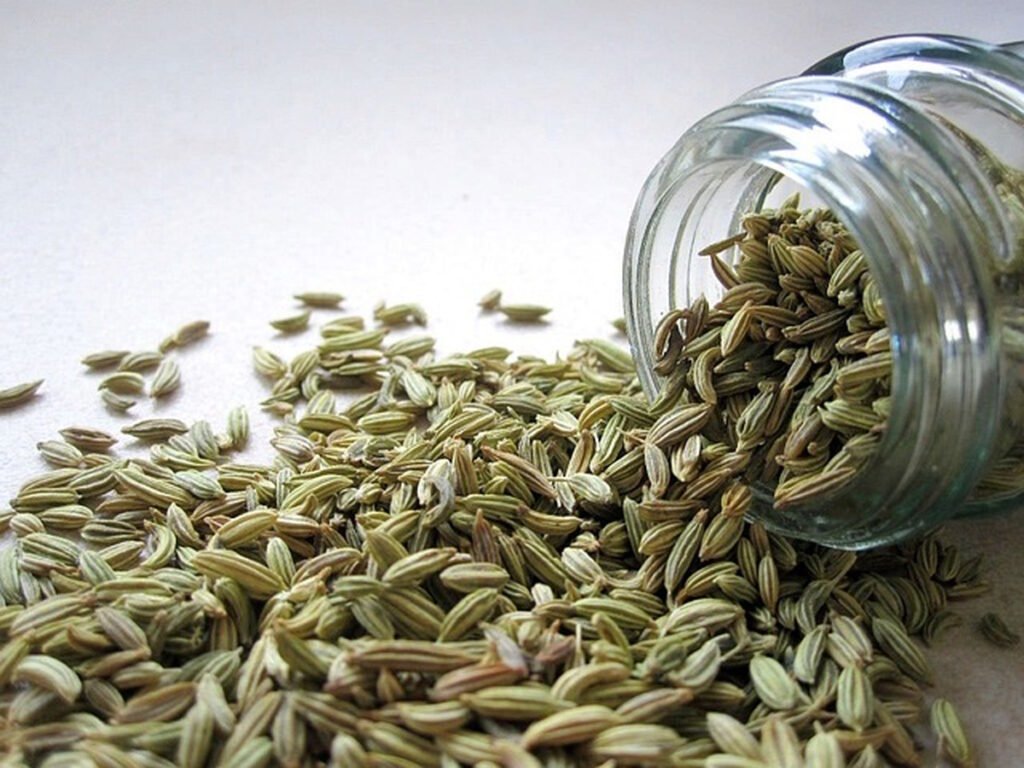
Fennel Seed Facial Cleansing Ritual at Home
Fennel Seed Facial Cleanser
This facial cleanser draws out all the dust and impurities in the top layer of the skin and gives your face a natural glow, leaving it smoother and softer.
Grind 1 tablespoon of fennel seeds to a coarse powder, then mix with 1 tablespoon of natural yogurt and 1 tablespoon of honey until smooth. Apply this cleanser to clean the skin and massage for about 10 minutes. Then rinse your face and pat it dry with a towel.
Fennel Facial Scrub
After cleansing your face, use a fennel seed scrub to help exfoliate dead skin cells and unclog pores.
Mix 1 tbsp. oatmeal and 1 tbsp. Add water and bring the porridge to a boil. Wait for the scrub to cool down, apply it, and massage your face for about 15 minutes. Afterward, rinse your face with clean water and pat it dry.
Fennel Facial Tonic
Fennel facial toner will leave your skin feeling refreshed and, with regular use, your face feeling lighter and brighter.
Boil 1 cup of fennel seeds in water (pour to submerge) for 15-20 minutes until all the essence is released. After cooling, add 2-4 drops of fennel essential oil. After straining the decoction to separate the liquid from the seeds, pour the tonic into a dark glass bottle with a spray nozzle and spray your face as needed.
Fennel Seed Steam Treatment
This fennel seed steam treatment moisturizes the face, opens the pores, and prepares the skin for the next stage—a face mask or a full-body scrub.
Add some fennel seeds to a steamer and steam your face, turning your face from side to side so that the steam reaches the sides of your face. Pamper your face in this way for at least 5 minutes.
This treatment is also very suitable for the sauna. Pour strong fennel tea on the hot stones, and the steam will spread throughout the sauna. The steam affects the face, and the skin all over your body.
Fennel Seed Face Mask
To make a fennel seed face mask, grind fennel seeds to a coarse powder, then add a tablespoon of flour and a teaspoon of turmeric with honey and milk. Add enough milk to make a creamy porridge that is comfortable to apply to the face. This mask will help you with all your skin problems and give you a healthy glow.
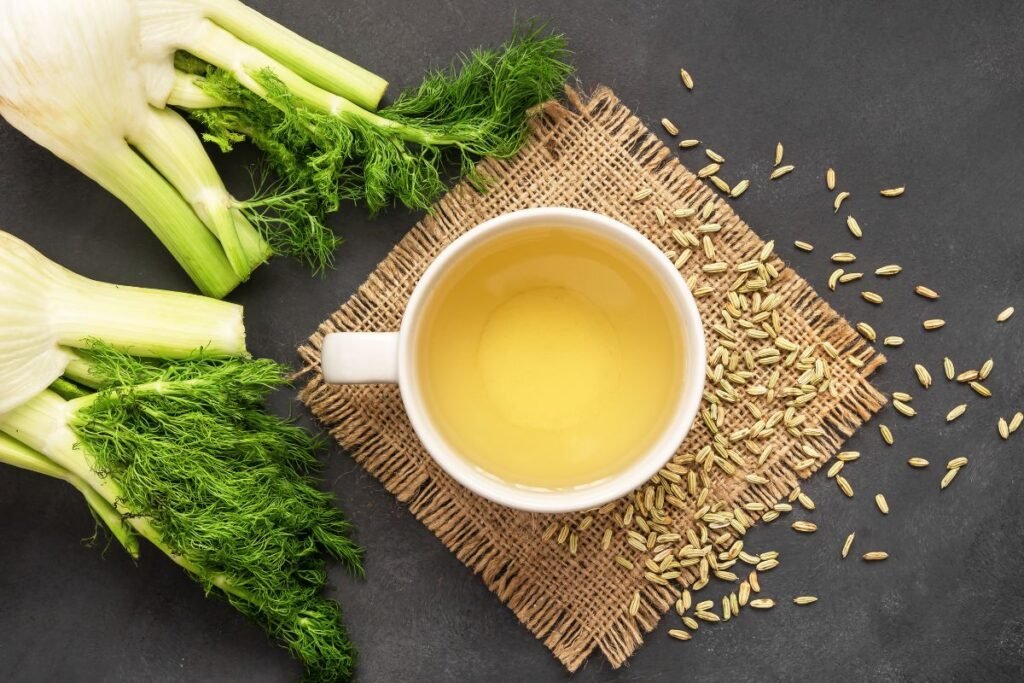
Side Effects of Fennel Tea
There is no recommended daily intake for how much fennel tea is safe to drink. Since fennel tea affects digestion, start with one cup and see how your body reacts to drinking it.
It is a good idea to avoid fennel tea if you:
- Pregnant: expecting a baby. The estrogen in fennel tea may confuse the pregnant woman’s body, which is already stressed by hormonal fluctuations. This tea can cause uterine contractions that lead to premature birth.
- Some mothers used to give their babies fennel tea to relieve abdominal colic. However, this tea contains oestradiol, which has been identified as an estrogen and a possible carcinogen in the case of hormone disruption, making it unsafe for consumption not only by infants but also by adults.
- It is not advisable to consume fennel tea when breastfeeding, as this tea is passed on to the baby through the milk, together with the presence of oestradiol, which is considered to be an unsafe concern.
- If you are allergic to carrots, celery, or wormwood, you should also avoid fennel tea, which belongs to the celery family.
- Do not drink fennel tea if you are taking blood thinners or if you have bleeding disorders.
- Young girls may develop breasts earlier with fennel tea.
Like many herbs, fennel is being studied as a medicine. Despite its possible side effects for some groups of people, it can have significant health benefits. For many, fennel tea can be a safe and effective remedy for various ailments. Start taking fennel tea slowly, at a lower strength, and in small amounts, monitoring your well-being and paying attention to possible side effects on your body. We always recommend that you consult your family doctor about consuming herbal teas.
Sources:
https://www.medicalnewstoday.com/articles/319651
Associative photos from © Canva.
